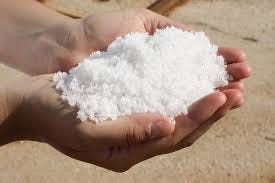One other vignette from my time at Dampier Salt that’s both unrelated to most of my usual themes, but also very strongly a part of my underlying zeitgeist.
Pool salt.
Dampier Salt was effectively a bulk chemical business. The international salt trade only really started in the 60’s, and large saltfields were created as adjuncts to several developing businesses (initially, the aluminium business – Dampier Salt was effectively commissioned by Comalco). While there were some elements of the “food business” supplied by us and others, the main customers were plastics, glass, road salt (de-icing in the Northern hemisphere) and bulk chemical manufacture.
Lake Macleod was a little bit different, by virtue of the very high purity of our salt, and its “whiteness” (both a function of its unusual source – a super saturated brine from a halite layer in Lake Macleod). This meant we supplied a bit more food-trade salt than usual for an operation like ours – mainly into west Africa and Malaysia.
But where does pool salt enter this equation?
The only domestic customer we had was this bloke who used to turn up with a truck every couple of months, and buy 40 tonnes of salt (two trailer loads). He was taking it to Perth, where his brother-in-law had a bagging plant (for stock feed) with some spare capacity. Our basic international price for salt was about $20/tonne, so we’d sell it to him for $40/tonne. It was barely worth the cost of the extra paperwork we did to maintain him as a local buyer, but what the hell, we did anyway.
He’d take our 40 tonnes of salt to Perth, package it as 20kg bags, and sell it as pool salt for about $10/bag. That turned our $1600 worth of salt into about $20,000 worth of pool salt – if you threw in costs, he was making a reasonable profit. He was an operator, a classic middleman, who had several deals like this happening at any one time.
One interesting sidelight was that he originally started this deal with our Dampier operation – but when he bagged up their product in his clear bags, and put it on the shelf next to other pool salt, it looked brown (they got a bit of iron ore contamination in their product). They referred him to us instead – we had the whitest salt in the world, and were closer to Perth. Win/win.
But it was the unique mechanics of the deal that always fascinated me – it only worked because he “borrowed” the truck & trailers (from a mate, who he probably slipped a few bucks or cartons to), had access to an underutilised bagging plant that he also got at bargain rates from his brother-in-law (again, probably some cash or cartons, or a returned favour somewhere), and had worked out distribution in Perth to a few outlets he could handle himself. It was the essence of the perfect middleman, the bloke finding a place and a market and marrying underutilised resources to a product to turn a buck. You can’t design or plan a market like that – you just need to stay out of the way and let it happen.
I couldn’t do any of that – as I’ve already pointed out, I’m a corporate man, comfortable at the bulk end of the commodity market. But it was one of the things that forced me to recognise, and appreciate, those who not only can do it, but wouldn’t live any other way.



